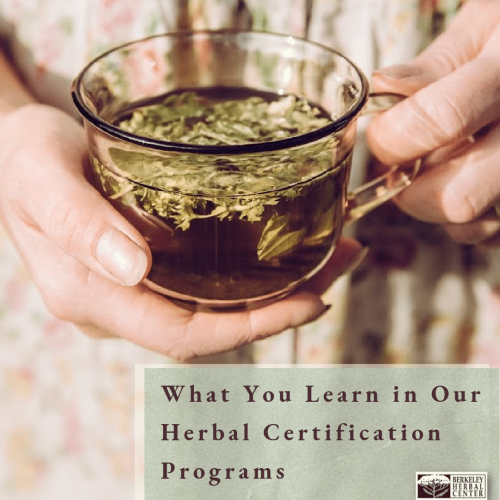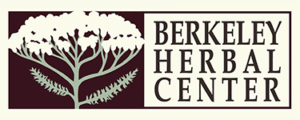
Did you know that we offer three long term certification programs in our herbal school every year?
It is important for us to be able to meet our community’s needs when it comes to their herb education.
While all of our long term programs result in being a certified herbal practitioner, each of our herbal school programs is set up a bit differently depending on the time you have available.
The information we offer is similar, but each type of class brings its own vibe to the group taking the class..
The Village Herbalist is an online herb program. The classes are shorter, less rigorous, and it’s much less hands-on over the two year time. The year-long classes end with a camping trip for students. This class is great for long distance learners that are primarily interested in learning the course information. Students that take this course are less likely to move on to the clinic program in person.
The Foundations and Therapeutics program is a two year long nighttime herbal school. It is in-person at our Berkeley Campus every week for a few hours and includes monthly herb walks and several overnight camping trips. It is perfect for learners that want to work full time while they pursue their goals in herbalism. Students here can move forwards to the clinical program after graduation.
The Apprenticeship Program is 8 months long, and is an in-person herbalist program. It is an intensive that meets three full days per week. This herbal school program is ideal for learners that want to dive full time into herbal medicine. This program filters easily into the clinical apprenticeship program.
If you want to learn more about these programs and find the right one for you, take a look at the certification page. There is a great choice for every herbal learner!
All three of our programs teach very close to the same curriculum. The predominant difference is your class time and the amount of time it takes to complete. Here are ten things you’ll learn about in any of our programs.
Herbalism and the connection to our planet is intrinsic to the indigenous folk that we learn from. Students study and learn about medicine from indigenous cultures in the US and around the world.
We also study folklore from around the world – because there is vital information in the stories of the herbs and the history of medicinal practices around the world. We allow for our students to lean into the depth of magic, fey, and the old folk.
It wouldn’t be an herbalism course without learning about plants! You’ll learn about the healing properties of the plants. There’s more to plant medicine than just, “use chamomile for sleep.” They have flavors, they take actions throughout the body, they’re made out of things that affect us in different ways, and they hold energies that can make all the difference in a formula.
To go along with learning about plants, in our programs, you’re expected to try out a different herb each week. You’ll create your own materia medica, complete with your own personal experiences, and a body of monographs that you can pull from within your practice (these will be checked by your teachers).
To graduate from the second half of our programs, you also need to complete an “herbal dissertation” that you present to your classmates and your teachers, showing your own research and sharing a long form essay.
This includes learning how to make teas, tinctures, skincare, poultices, salves, aromatherapy solutions, and anything else you want to create. We have a staff medicine maker that is highly trained that you learn from.
You will learn how to create the medicine itself, and how to formulate it so that you can heal your clients more effectively.
Within the first part of the program, you will create your own herbal first aid kit. You will have guest speakers that talk about how to address common issues that come up in herbal first aid and what you can do in emergency situations.
We offer guidance and consistent classes around maintaining health and vitality throughout the entire year for you and your community.
In the Foundations and Therapeutics and the Apprenticeship courses, we require you to attend regular herb walks and to learn botany so that you can identify the plants in your neighborhood. You will also attend overnight field trips to discuss wildcrafting and how to use plants from the wild.
In the village herbalist, this is a bit more difficult as learners can be from all over the world. At the end of each year, we hold a long herbal camping trip where you can learn about the world outside.
We are healers. We don’t just play with plants and frolic in fields of wild oats. We’re focused on deeply understanding the human body and how our organs work together to keep our system running. You will learn about each body system independently, along with their interconnectedness as a whole.
We also study pathology as a way to identify dis-ease within the body and treat root causes of issues to help clients find better health overall.
Every person has their own constitution – their own unique balance. What works for one client may not work for another, and it’s important to know how to read what someone needs. We teach you how to do this based on a person’s biological and emotional constitution.
You will learn how to offer therapies in the form of herbal medicine, energetics, and other healing modalities. You will also know when to send someone for further testing and how to recommend other therapies that can help them improve their vitality.
The second half of our long term programs offer the opportunity for growth in the clinical field. While in the first half you learn about the body, therapies, and plants, the second half is about putting the knowledge to the test.
You will receive case studies, with constitutional intake forms, and information about actual herb clinic clients that you have the chance to create treatment plans for. Our faculty will help to guide you through what treatments worked well for them and show you how to build acute and long term formulas for actual people.
Many of our students go on to create their own brands, and we help to foster that practice – whether its a product line, a clinic of their own, working with other herbalists, or even building another herbal school somewhere that needs this type of education!
In our long term program you have the opportunity to learn how to create and market your products. You can join our 2-3x yearly herb fair and get a jumpstart on selling your creations through our supportive herbal community!
If you’re interested in joining one of our classes and becoming a certified clinical herbalist, you can find the right course for you by clicking here.
If you have any questions please send us an email to studentservices@berkeleyherbalcenter.org
See you soon!
Support Our Work
Berkeley Herbal Center is a 501(c)(3) organization, so all donations are tax deductible. Tax ID #14-1975183
If you would like to donate by check or cash, please send an envelope addressed to:
Berkeley Herbal Center
1250 Addison St., #G
Berkeley, CA 94702
